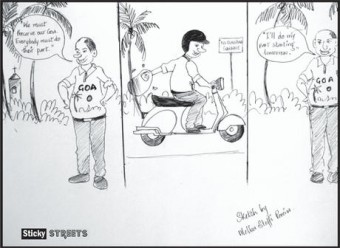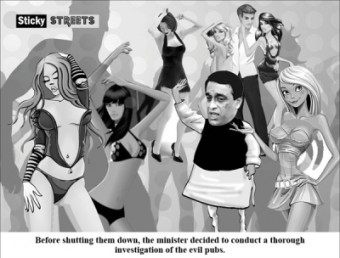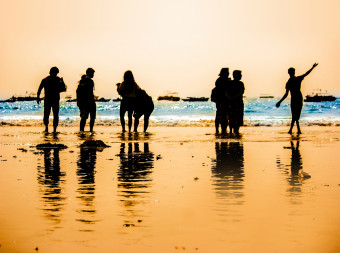A Movie Buff’s Paradise Bares Joy and Tragedy Of Humanity
This Year’s IFFI Has Taken Me To Iran, China, Angola, Canada, France, Korea, Latvia, Afghanistan and the Philippines
I’m an experienced IFFIan. A week before the Fest, I bought myself a comfortable pair of walking chappals that worked well for me. I knew there’d be a lot of exercise involved in between the shows and screenings. I took the bus from my house to the ferry at Betim. At 0830 hrs, the ride across the Mandovi to the jetty at the Panjim end was a treat by itself. I walked to the theatres. Outside the Entertainment Society of Goa (ESG) gate, there’s a bustle of people to-ing and fro-ing from the bazar next door, fish and vegetables stuffed into polythene bags, and the bags themselves stuffed into bigger cloth bags. The people lugging them climbed into buses that were bursting at the seams. Real life, ready to be filmed, full of entertainment, pathos, humour, adventure, but I preferred reel life for the past week.
‘The Nights of Zayandeh-Rood’ was a must-see on my list. It was made by the Iranian director, Mohsen Makhmatbaf; I don’t miss any of his films. This one showed the experiences of a wheelchair bound Colonel, his daughter who worked in the emergency unit of a hospital and their experiences before and after the Revolution there. As always, the cinematography was brilliant, and the scenes gave an intimate glimpse into both, the lives of people who live under repression and stress that’s State or religion generated, and of those in love, parental or romantic.

‘The Nights of Zayandeh-Rood’
Another treat was the Chinese ‘Destiny’ by Zhang Wei, about the travails of an autistic child’s mother. The school, the teachers, the parents of the other children, her husband, her mother, none wants the child to be integrated in a normal school. And she doesn’t want to send him to a special school. Eventually, she starts teaching him on a railway platform, gets the attention of the media, the politicians, and the seeds of change are sown. Could have been India. What was thought provoking was that her brother, a psychiatric case living in a village with the mother, was caged and chained because he bit, hit and injured passers-by. What, I wondered, in the absence of institutions, could families do if members had problems like these? Could people battling poverty and hunger deal with them in any other way? Films trigger disturbing thoughts.
More disturbing was Ivo M Ferriera’s ‘Letters from War’, a Portuguese film in black and white on the life of a doctor during the strife in Angola. He wrote, tender, poetic words to his pregnant wife who knew nothing at all about the horrors her husband was witnessing. Not a word was spoken about the conditions the soldiers were living in. The images, in stark contrast to the gentle letters, were far more effective. The cruelty, the pain, the loneliness, young men fighting wars that old men created.Dying, getting maimed.The desperate longing for normalcy. I couldn’t help thinking about our own soldiers suffering at Siachen heights, their families in remote villages having no clue about icicles formingtheir lungs. The other movie about war was the French “Farewell My Indian Soldier’, a documentary, fictionalized to bring us a slice of our own history overseas.

‘Letters from War’
Canadian Denis Cote’s ‘Boris Without Beatrice’ was an intense film about the personal life of a politician whose husband’s bullying (well, extra-extra-caring) personality pushes her into depression. He imprisoned her with his constant watchfulness, his unrelenting ruling of what she did, how she did it, what she said, when and where she said it, etc. A different kind of film-journey.

‘Boris Without Beatrice’
Undoubtedly the most dramatic film I saw was ‘The Throne’. Music that inspired passion (a day later it’s still reverberating in my head), regal colours and sets, based on a true story in the history of the Korean royalty. After seeing films on poverty, the marginalization of minorities and the ravages of war, this was a change, though it was also about the darker side of humans: greed and murder.
Olga Hepnarova in the movie with her name in the title is about a lesbian whose family doesn’t understand her, who doesn’t fit into school/hostel/office and eventually becomes violent and depressed at the same time.

Olga Hepnarova
In ‘I, Daniel Blake’, the problems of red-tape and bureaucracy that drive a sincere but ill unemployed man are brought out in a way that brought both smiles and tears to the audience. Wish more films like these were made serious topics.

‘I, Daniel Blake’
The Philipino ‘Ma Rosa’ might well have been shot in Mumbai’s Dharavi. A small shop-owner with four children sells narcotic, banned drugs to earn some money. One day, the police raid and arrest her and her husband. The small-fry are caught and the big-shots roam free. The children try to raise money to get their parents out of the clutches of the corrupt police.
For the last two IFFIs, I’ve seen films from Afghanistan that depict how the public wants freedom from the repressive religious fundamentalists who ban music, theatre, the arts and women from wearing/studying what they please. ‘Kabullywood’ is about a group of young artists who try to save a cinema hall from being shut down.
‘Mellow Mud’ showed us the life of a poor Latvian girl and her brother. The sudden death of their grandmother throw the children into situations even mature adults would find difficult to deal with. There was no music, no score, and plenty of silences that held the audience’s attention. These are the sort of films that make IFFI a pilgrimage for serious movie-buffs.
One regret: I didn’t get to see all that I wanted to. Never mind, I comfort myself, there will be another IFFI next November, and I will see more of the world again.
Top Photo: Scene from Olga Hepnarova




